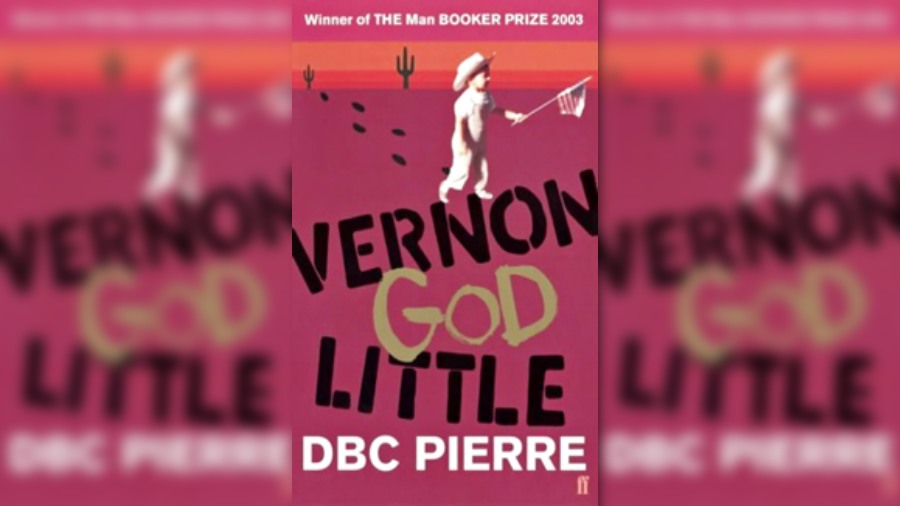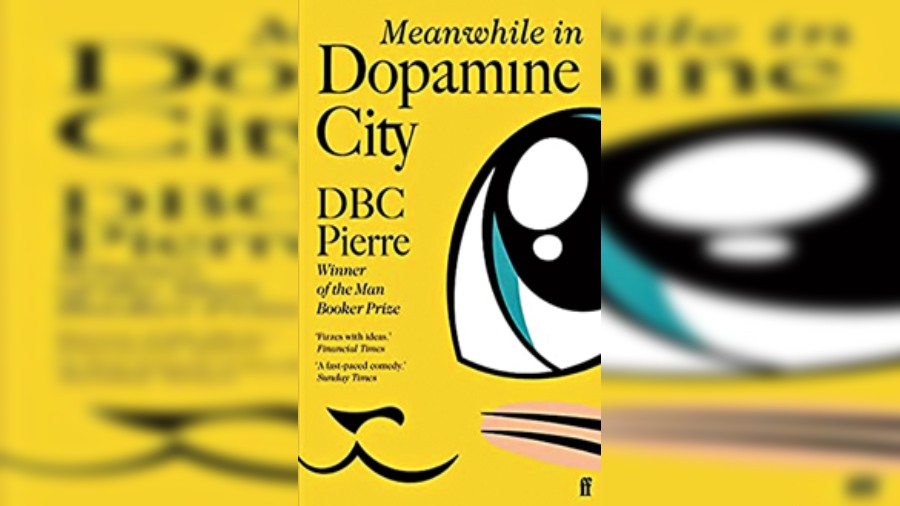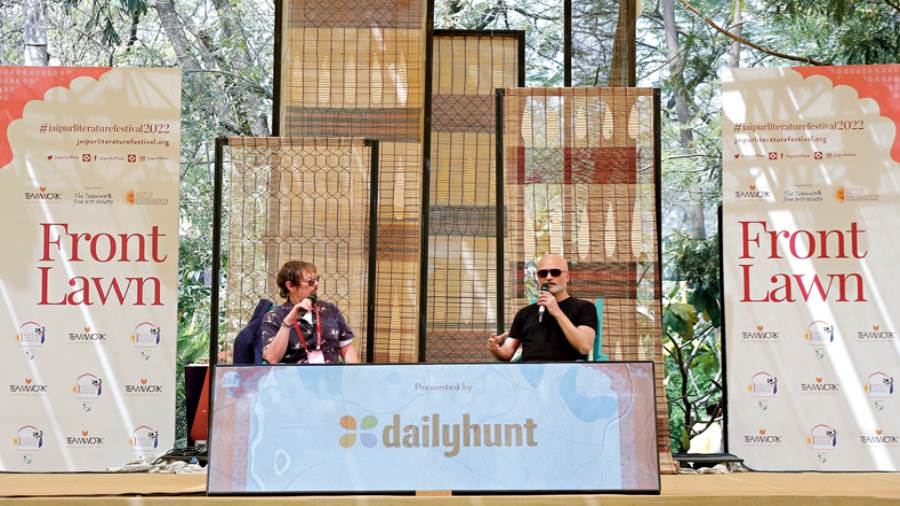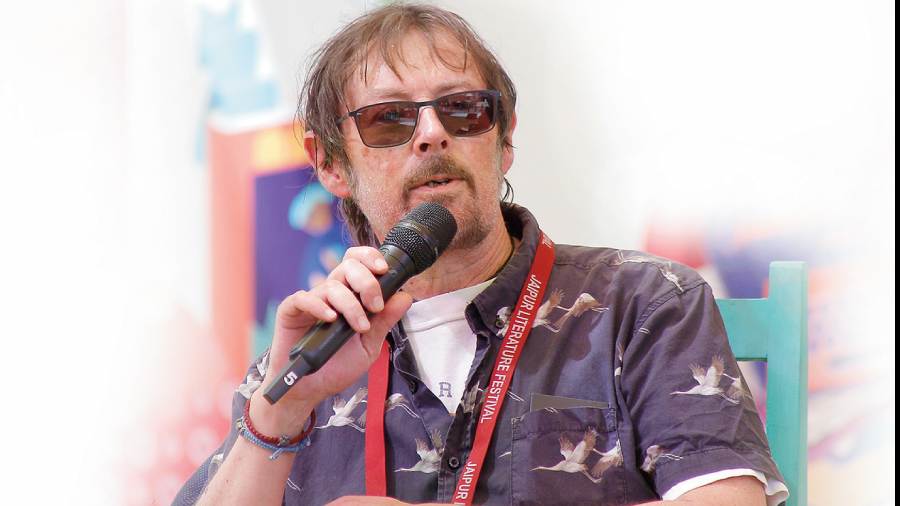DBC Pierre won the Booker prize for his debut novel Vernon God Little in 2003, amidst polarising opinions. Born Peter Finlay, it was his dubious past of being a conman and addict that led to the nickname Dirty But Clean (DBC), which found its way on the cover. He has written seven books, the latest being Meanwhile in Dopamine City. Not one to shy away from social dilemmas, he wrote Vernon God Little based on a school shooting and Meanwhile in Dopamine City addressing a world ruled by digital innovations told through the eyes of a sewage worker. The latter is an increasingly volatile read. Lonnie, a single parent of two children, struggles to emerge from the dark vestibule of digital disconnect (literally emerging from the sewage) to find his children engrossed in a world that travels at breakneck speed.
The brutally honest and candid author was at the Jaipur Literature Festival this year, where he found a few minutes to generously sit down with t2oS and have a conversation about all things allegory and pseudonyms. Excerpts.
In your conversation with Jeet Thayil, you said that writers should write using pseudonyms. Could you please elaborate on that?
I was quite surprised how the job of a writer had so little to do with writing. It was about managing my psychology. Initially, I thought it was just me –– that in some way I was just messed up, but the more people I speak to, I realise it’s a common human issue. Of the many issues that come with writing, one is a curious mirror on us. Honestly, when we sit down to write a book, most of what we write is bad writing. So one has to find a strategy to overcome the bad writing and still stay with the job. I discovered by accident that by putting my nickname on the manuscript as I was writing it, instead of my family name, it felt much more free and devoid of any expectation from my family or my past. I didn’t have any sense of being observed. So, really, I would recommend it to anyone starting to write.
Writing is quite unusual and, as we empty ourselves, we expose ourselves as well. So we need different tools of psychology to cope and putting a different name on the cover, even Earnest Hemingway for that matter, would make you objective. When you look at it, you can say: “No Earnest, this is shit.” It sounds so simple and stupid, but it actually works! We don’t have to be brave, we need all the tools we can get. The only objective is to get the job done.
You have said before that self-reflection led you to Vernon God Little. What led to Meanwhile In Dopamine City?
Oh just my alarm at how quickly the world was changing because of social media. I got the idea that anyone below the age of 15 will have lived their entire lives with their brain chemistry manipulated and we will think that is normal human life. They look at older people like me reminiscing about sunny days of childhood and they think it’s bullshit. We never used to argue with each other or hate each other to this extent. Everything is moving so quickly now that I wanted to write a story of a family, as if they were the last ones on earth, dealing with the idea that this is how it used to be and this is where we are being dragged now, whether we like it or not. That’s why I invented the single father with two kids.


Oh just my alarm at how quickly the world was changing because of social media. I got the idea that anyone below the age of 15 will have lived their entire lives with their brain chemistry manipulated and we will think that is normal human life. They look at older people like me reminiscing about sunny days of childhood and they think it’s bullshit. We never used to argue with each other or hate each other to this extent. Everything is moving so quickly now that I wanted to write a story of a family, as if they were the last ones on earth...
Pierre on why he wrote Meanwhile In Dopamine City

Social commentary rallies deeply on a feeling of alienation for the reader. However, your book chooses to emulate the emotion on the pages. What led to this choice?
Just by nature, I discovered after writing a couple of books that I like allegory. It’s just something that I naturally feel like doing. I like the structure of the book to resemble the subject that I am writing about. I had reached the end of the book when I realised that the book didn’t make you feel what the father was experiencing. So, I went back and designed it into a binary system where you don’t have to read both columns but you are aware that there is another constant information feed happening and I just wanted that sense. This is the same feeling that I had and the character had, that we have left the old, unified world behind and now we live in a binary world where the two worlds don’t necessarily tally with each other.
You read verbatim from the book straight from your memory. What is your writing process like?
I am not that strict and I write every day, six days a week. I like to drink on Fridays and I am not like (Charles) Bukowski who could write drunk. I write by night because it’s quiet and the body is quiet, not demanding food. So I can use those hours and immerse myself in the work. Essentially, I quickly write the first drafts without looking down and then I spend most of the time going back and improving it by adding the things that excite me. I do remember the book plenty there. I don’t read it ever again after that though!
You are a firm believer of second chances, but have divided thoughts on cancel culture. How do you align the two thought processes?
I was a sensitive kid myself and I don’t believe in cancelling people out completely. I don’t agree with that idea of trampling someone’s emotions just because I want to be clever or fun. I am very surprised that institutions and huge groups of people actually respond and follow it. If people had to physically write a letter on a piece of paper, put a stamp on it and walk to the mailbox to send in a complaint, we would see 99 per cent reduction of complaints on social media. The fact that you can sit at home in a bad mood with your coffee and f**k someone over by typing something is also a conduit for psychological power. I am being absolutely careful with the words I use because the causes of cancellation can also be absolutely agreeable and just, but I am talking about the downside or negative side of cancellation here. I do apologise for my failings, but I do believe that we do need to protect a space where we talk to each other and books are perfect for that reason. It’s communication in a seance, brain to brain, from stranger to stranger. Obviously, life is a hit and miss so even if we disagree, it doesn’t work but sometimes it does and it’s worth it.

DBC Pierre (left) and Jeet Thayil at the Jaipur Literature Festival 2022
There is a question I ask every author with two distinct schools of thoughts emerging –– does fiction need to be politically and socially responsible? What do you believe?
No, absolutely not! Because then it becomes propaganda. Fiction has no responsibility at all except be well-written. Of course, my books have a political angle because my stories are built from news stories. Literally from one newspaper, I can find all the subplots of a novel and I make all the stories happen to one character and then see how he/she navigates through that. One should be able to write whatever they feel like writing!
What are your thoughts on India and the readers you have been interacting with at the Jaipur Literature Festival?
I loved it! Listen, I love India. This is my first time in Jaipur and this has been the most immersive experience in the country ever. I absolutely love it! People overseas can get the wrong idea with everything getting categorised or stereotyped, but to come here and get the reality –– this vibrant, competitive, intelligent, thriving group of people –– the sun is shining in this century on this country and no one can do anything to stop India from thriving. It is happening by itself and the lotus flower is opening...
Also, I was really surprised by a large number of readers here, engaged with different ideas, and I love that! People asked sensitive questions and, hopefully, no one was offended by what was discussed. People are happy to engage with new ideas and that is the strength of this country. I hope I can come back soon!
What are you reading right now?
I am looking forward to reading the works by my co-panelist. What I was reading right now is a novel called Fortune by Amanda Smyth and it is an amazingly written story about East Indians on the island of Trinidad around the time they discovered oil. It’s a fantastic story about this gentleman Sonny Chatterjee.
I have a non-fiction book about fate, mathematics, gambling, probabilities, and great fortune. It’s called Big Snake Little Snake and it’s basically my idea that answers are all around us and we just need to look around us in nature.
